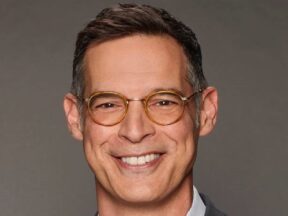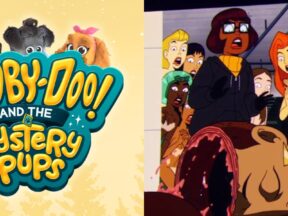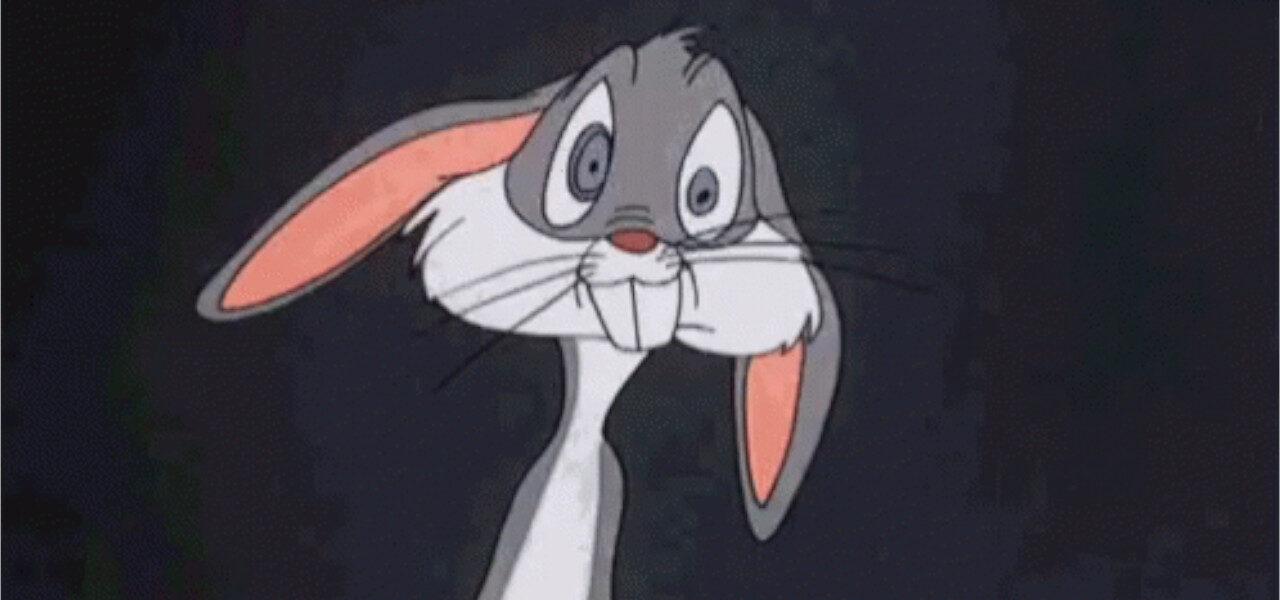
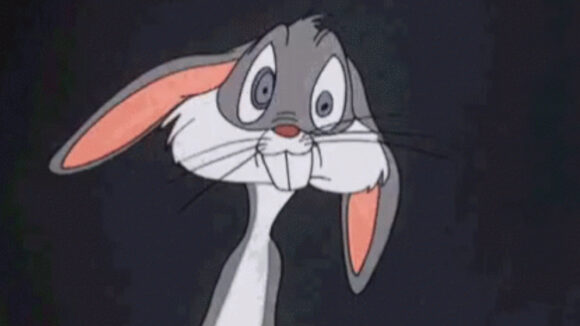
Confusion Reigns Over Future Of Animation At Warner Bros. Discovery
Warner Bros. Discovery (WBD) hosted its Q2 earnings call on Thursday, in the middle of a tumultuous week which saw the company make a series of high-profile film and tv cancellations that had many worried about the future of animation at the company.
The call was introduced by executive vp of global investor strategy Andrew Slabin, led by WBD CEO David Zaslav, and featured presentations by WBD global streaming and games CEO and president JB Perrette and CFO Gunnar Wiedenfels. After the executives presented their data, they took questions from investors.
While the call didn’t come close to clearing up all the questions surrounding Warner’s animation plans, it did offer plenty of clues about where the company is headed.
Is it all doom and gloom at Warner Animation? Across the internet people are lamenting the demise of animation at Warner Bros., but based on the information presented during the earnings call, reports of the company’s animation decline may have been greatly exaggerated.
That’s not to say there won’t be cuts, or even major cuts, to animated productions across Warner Bros. brands. However, there seems to be a great deal of misinformation and conjecture floating around. Contrary to several reports and some viral social media posts, nobody who spoke during the call said anything concrete about kids and animation content seeing a broad range of cuts across streaming and linear platforms.
In fact, more than once the WBD executives provided bits of hope for the future of animation at the company. While extolling the virtues of Warner Bros. Motion Picture Group’s IP catalog , Zaslav said that with “DC [and] the animation group, together with the entire Warner library, our ambition is to bring Warner back and to produce great high-quality films.”
“We will spend significantly more on the HBO Max product; in other areas we’ll spend less because we’re not finding an effective return,” he explained. It’s entirely possible that the Warner team sees animation as one of the areas that isn’t providing an effective return, but it feels premature to assume animation falls into that category based on available information.
So why is everyone freaking out? Much of the furor regarding Warner animation comes from announcements earlier this week that the nearly-finished Scoob! Holiday Haunt and third season of Little Ellen both got the axe. With the cloud of those cancellations looming, stress was likely multiplied when those watching the call saw a slide titled “Course-Correction Measures Initiated” in which Wiedenfels outlined a “restructuring of content portfolio for scripted linear, kids and animation, direct-to-HBO Max films, and international local content.”
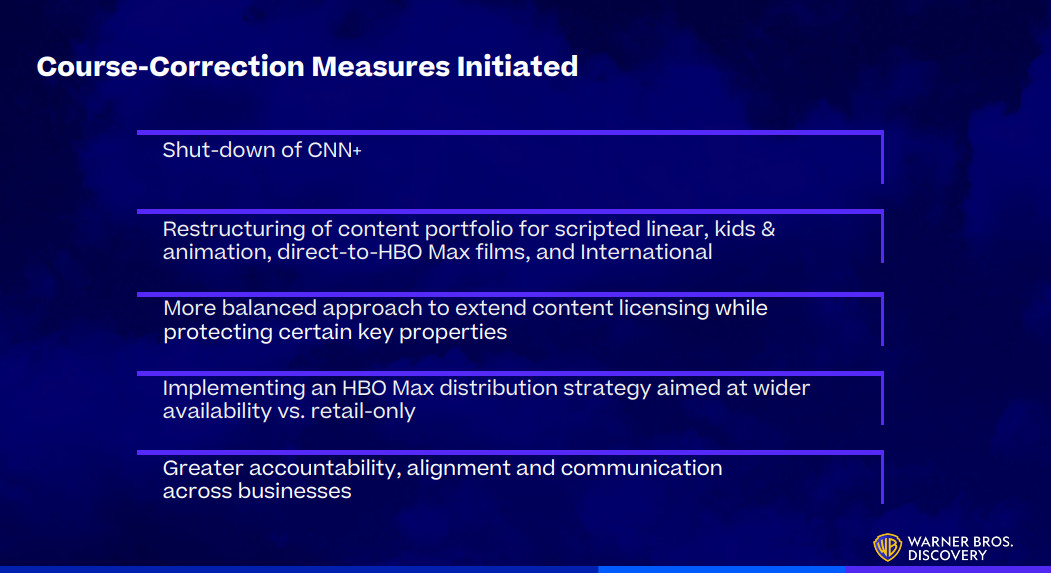
The speakers could have been much clearer about where future investments in content will go. Seeing as they weren’t, it’s little wonder people are worried about the future of animation at Warner. But, nothing that we saw or heard during the call gave the conclusive impression that animation is on the chopping block at Warner.
Where does the feature division, Warner Animation Group (WAG), stand? According to Zaslav, feature film companies within Warner – like WAG – are a major part of the organization’s plans going forward, but conditionally. Any film produced by a Warner company will have to be theatrical quality, and the company will only release films when they think they’re ready.
All Warner films will get an exclusive theatrical release, although window-length can and will vary. When the exclusive theatrical window lapses, Warner films will first be available for sale or for rent, and only then hit streaming platforms.
“When you’re in theaters, the value of the content and the overall viewing experience is elevated,” Zaslav argued. “Then when the same content moves to PVOD and then streaming, it is elevated again. As films move from one window to the next, their overall value is elevated, elevated, elevated.”
The CEO also emphasized that he wants Warner to be agile going forward. That might mean that certain films get shorter theatrical windows or different marketing campaigns, but the feature side of the business will always focus on theatrical first.
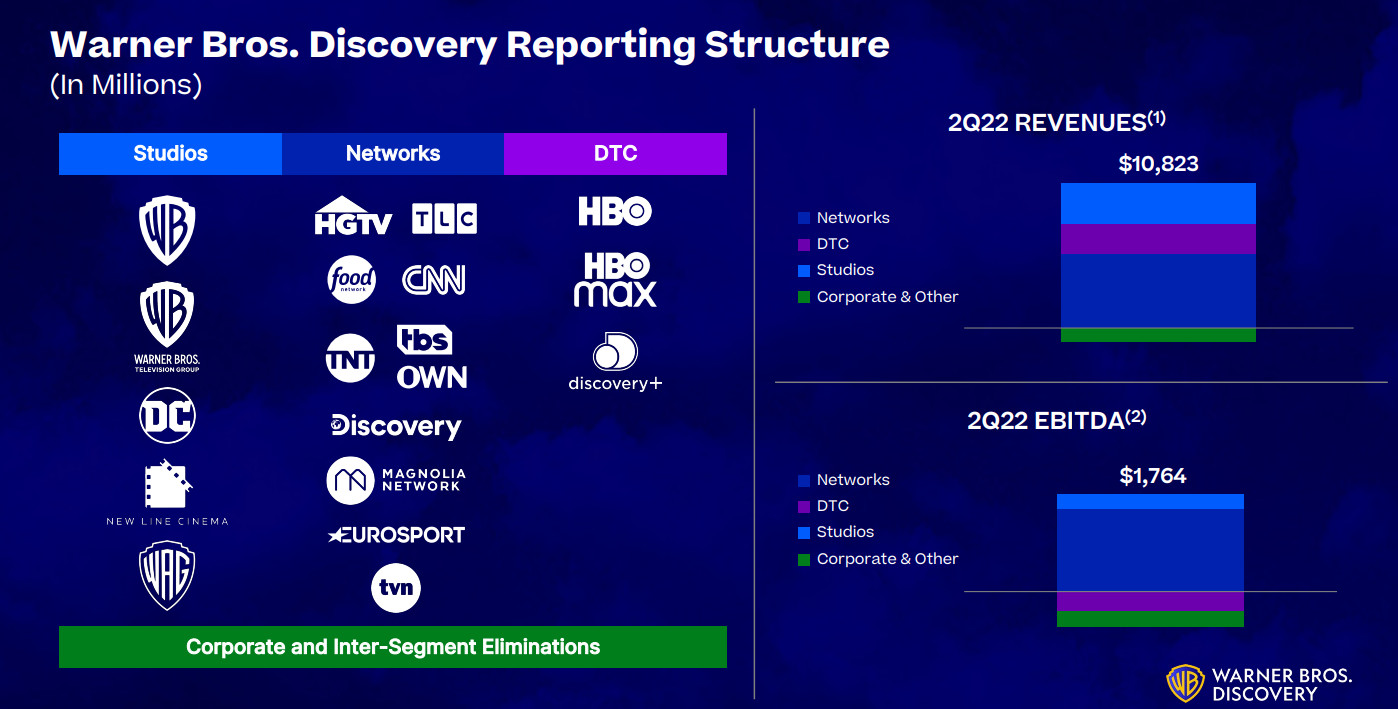
What about tv and streaming? What does the future hold for Warner Bros. Animation and the company’s Turner networks like Cartoon Network, Adult Swim, and Boomerang? This is where things get a bit cloudier. In April of this year, WBD cut scripted programming development at TBS and TNT. Questions lingered, and linger still, about the future of some of those networks’ ongoing original series. American Dad, for example, moved to Warner Bros. Discovery’s TBS from Fox in 2014 and was renewed for two more seasons in December 2021. But WBD’s new belt-tightening measures on Turner networks raise new questions about the show’s future.
During the earnings call, Wiedenfels outlined the strategies that didn’t work for Warner under previous leadership. Pointedly, he called out “significant incremental and loss-making content investments for the Turner networks. Specifically, content spend on shows that did not have a path to generate sufficient ratings or incremental monetization potential.”
That sounds bad, but it’s also very vague. And, if sweeping cuts were planned from the company’s tv division, would Warner have commissioned so many animated productions this summer? Examples include two Scooby-Doo series; Chelm: The Smartest Place on Earth from Sacha Baron Cohen, Mike Judge, and Greg Daniels; Batman Azteca at HBO Max Latin America; indie sci-fi series Scavengers Reign; two anime series in Rick and Morty: The Anime and Ninja Kamui; and kids shows Driftwood and Invincible Fight Girl.
Does Warner’s change in strategy present any potential advantages for animation fans? For glass-half-full types, Wiedenfels’ comments could indicate that any show, animated or otherwise, that does generate sufficient ratings or proves potential for monetization is safe. And, while speaking about exploiting legacy content, Zaslav name-checked Looney Tunes and Hanna-Barbera as brands that Warner will look to profit from in the future.
“We are home to many of the most iconic brands,” the CEO explained in the post-presentation Q&A. “The opportunity this presents is truly unmatched. We’re also the preeminent maker and seller of content in the world. And going forward, we will continue to invest smartly in content in ways that will help us to grow, achieve greater market share and have a bigger impact.”
That doesn’t necessarily mean that all the classic Looney Tunes shorts or The Flintstones will be back on HBO Max or some other platform, but it sounds like Zaslav wants to find ways to make the most of those assets, which could be good news for fans. It also sounds like any animated production that can make the company money will have a place at WBD going forward.
According to Zaslav, when Warner Bros. and Discovery made the decision to merge, “Our objective was not only to be one of the top global streaming companies, but also a media company able to drive financial returns by distributing our content on every platform, and our conviction has not changed.”
So is it possible that we might get to see Scoob! Holiday Haunt and Little Ellen someday, somewhere? It’s hard to say. According to the Scoob! filmmakers, their film was 95% finished. If they aren’t allowed to wrap up the final 5%, it seems unlikely that the film will ever see the light of day, at least through official channels. But it’s not out of the question that a third-party like Netflix will step in and offer to finish the film; Netflix has already done this with Blue Sky’s Nimona, which was orphaned after Disney took over the studio and shut it down.
Little Ellen, on the other hand, is completely finished and was originally supposed to premiere in June. With three full seasons, perhaps Warner will elect to find a new home for the series, and season three will be released there.
That either of the productions will be available on HBO Max anytime soon seems like the least likely outcome given Warner’s new streaming strategy.
What about DC animation? Without mentioning animation specifically, Zaslav was enthusiastic about the future of DC, and said that Warner is going to try to emulate what Disney has done with the Marvel Cinematic Universe. Extrapolating from that ambition, it seems likely that animation will continue to be a major part of the DC universe, just as shows like What If…?, X-Men ’97, and a slew of kids shows all help to supplement the Marvel Cinematic Universe for Disney, even if they’re not part of the official MCU canon.
Final thoughts: We’re not arguing that anybody or any project is safe at Warner. But, based on the information that is currently available and the context of recent announcements made by the company, it does feel like maybe the sky isn’t falling at Warner Bros. Discovery animation just yet.

